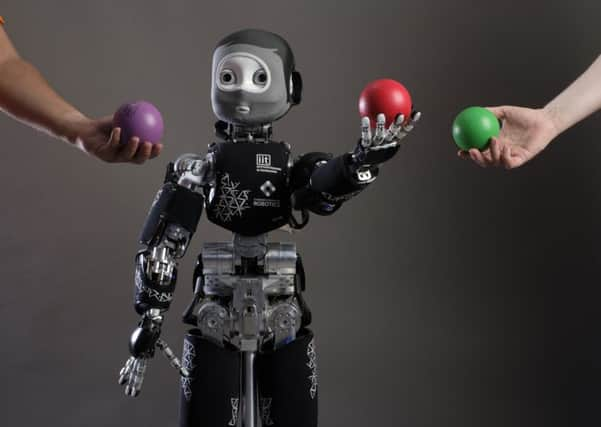Robot army enrolled to help Parkinson's fight


Academics at Heriot-Watt University will collaborate with Brazil’s International Institute of Neuroscience over the next year to search for a cure for the debilitating disease.
The study will use data from robots in the UK, combining neuroscience expertise with robotics, computational brain modelling and machine learning.
Advertisement
Hide AdAdvertisement
Hide AdThis will be supplemented by data already recorded from animals in Brazil.
However, there will be no need for animal testing in the UK, as traditional methods of testing on rats will be replaced by robots.
Despite years of research there is still no cure for Parkinson’s, a degenerative disease that causes tremors, loss of balance and slowing of movements.
It currently affects more than 3 per cent of people over the age of 65, with figures set to double in the next 15 years.
Advertisement
Hide AdAdvertisement
Hide AdDr Patricia Vargas, lead collaborator and founding director of the Robotics Laboratory at Heriot-Watt said: “This is a fantastic research project for our team to be working on.
“Not only will we possibly see new therapies for a life-limiting illness, but it will also reduce the need to use animals for research.
“Parkinson’s disease affects individuals and families across the world and scientists in Brazil and worldwide have been working hard to come up with new therapies, but this project clearly demonstrates the positive affect robots can have on medical research, which can advance our knowledge about Parkinson’s beyond what is obtained through the use of anatomical and physiological studies alone.”
The study will see expertise shared between the Robotics Lab at Heriot-Watt University and the Edmond and Lily Safra International institute of Neuroscience in Natal, in the north-east of Brazil.
Advertisement
Hide AdAdvertisement
Hide AdIt has been financed with funding from The Newton Fund and Royal Society in UK under the Newton Advanced Fellowship scheme.
Charity Parkinson’s UK welcomed the opportunity to move away from animal testing in the fight against Parkinson’s. Annie Macleod, Scotland director at Parkinson’s UK, said: “As a charity, Parkinson’s UK subscribes to the “3 Rs” policy – to reduce, refine and replace the use of animals in research wherever possible. We warmly welcome this study and the potential it holds for reducing or replacing the use of animals in future.”
Latest Home Office figures show that more than 3.7 million animals were used as test subjects in the UK in 2017.
The new study has been announced as Heriot-Watt University embarks on a Year of Health campaign. This will involve a calendar of engagement that spans schools, communities, businesses and government.
Throughout 2019, the campaign will highlight the university’s research and the ground-breaking discoveries that are helping drive innovations in healthcare, diagnosis and treatment.